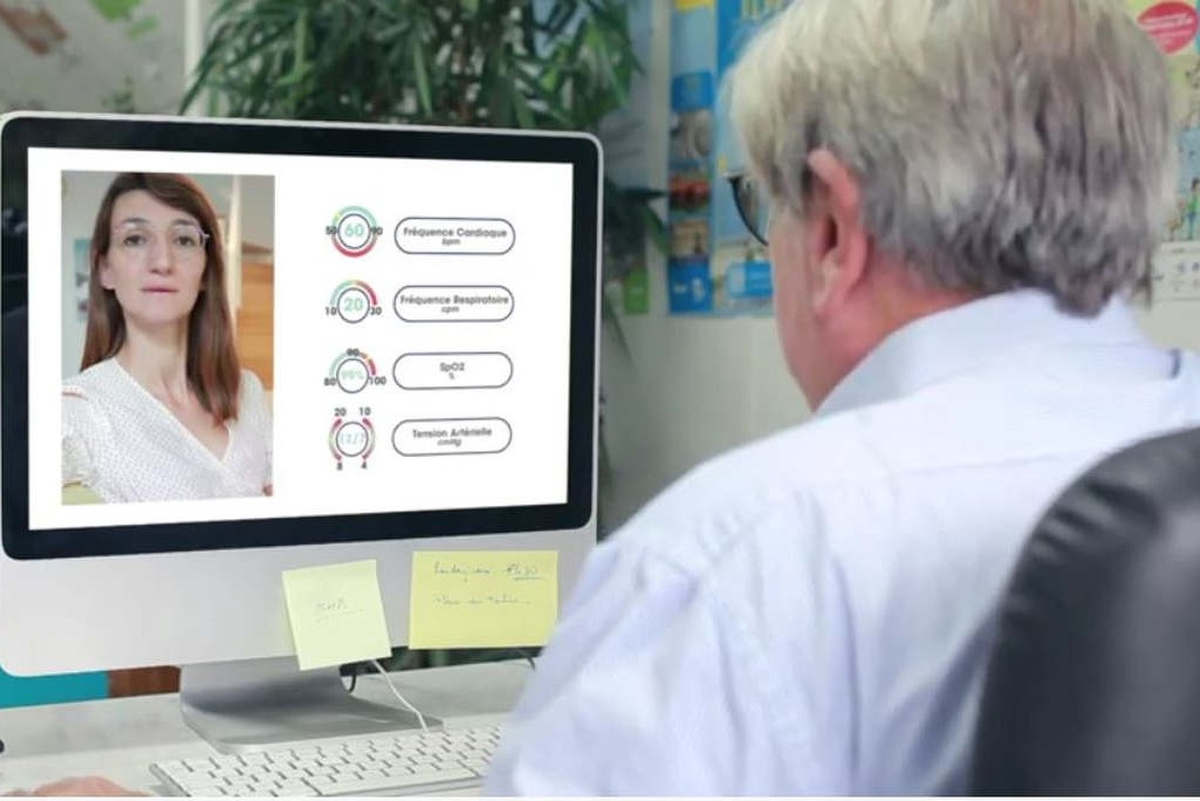The Nancy CHRU is conducting a clinical study to validate the medical device developed by the company I-Virtual, which makes it possible to measure patients’ physiological variables remotely and without contact.
Developing this type of easily accessible solution is essential in the face of the Covid-19 pandemic. It is also a concrete response to the problem of medical deserts where the population lives more than 10 km from the nearest general practitioner.
The Caducy medical device
Caducy, a medical device developed by the company I-Virtual, could, in the future, improve patient care during teleconsultations. It allows, via the webcam of the patient’s computer or cell phone, to measure vital parameters such as: heart rate, respiratory rate, blood pressure or oxygen saturation in the blood.
This innovation, which is based on advanced techniques of non-contact photo plethysmography and artificial intelligence, is presented in the form of an intuitive interface that the user activates by standing in front of the camera to allow the recording and analysis of his data.
The CardiaSens study
More than 1,000 patients participated in this clinical study conducted at the Nancy University Hospital in the Department of Functional Respiratory Explorations and the University Center for Sports Medicine and Adapted Physical Activity at the beginning of December 2020, just one month after receiving authorization for implementation from the French National Agency for the Safety of Medicines and Health Products, as well as a favorable opinion from the Committee for the Protection of Individuals.
The objective of the study is to compare the physiological data (heart rate, respiratory rate and oxygen saturation) measured by Caducy to those obtained with reference measurement systems and to ensure their consistency.
Currently, the analysis of the results is being completed and the scientific paper is being written. Other studies should follow to validate the accuracy of measurement of other physiological constants such as blood pressure.
The Nancy CHRU
A public health institution with 9,000 professionals, the Nancy Regional University Hospital Center provides care, teaching and research. With more than 40 medical and surgical specialties, it treats 700,000 patients each year for 480,000 consultations, 136,000 hospitalizations (half of which are outpatient), 80,000 emergency visits and 3,300 births. The establishment is a driving force in the development of research projects, particularly in digital health. Today, thanks to its structures in this field (Biological Resource Center, Clinical Investigation Center, Promotion, Vigilance, Investigation, Data Management and Statistics Methodology), it is home to a health start-up project hotel and is developing an Institute for Research and Innovation in Health (IRIS), which has enabled it to rank 10th nationally in terms of research. http://www.chru-nancy.fr/
I-VIRTUAL
Founded in 2014, I-Virtual is a start-up specializing in image and data processing for everyday health and well-being. Originally, Pruski, whose research focuses on helping people with autism, teamed up with PhD Moussaoui, who is passionate about algorithms. The fusion of their fields of expertise allowed them to develop a model for apprehending scenes from everyday life through virtual reality. Because they wanted to adapt these simulations to the emotional states of patients, such as stressful situations for example, they decided to develop a tool for non-contact measurement of heart rate: this was the genesis of Caducy. By mid-2021, the I-Virtual team is made up of about 20 employees (engineers and PhDs) under the responsibility of Gaël Constancin, who took over as president of the company in 2019. As a precursor of the “contactless” offer, I-Virtual’s ambition is to bring to the world of telemedicine the missing bricks for its full integration in new lifestyles. Its Caducy product is thus of real interest for the prevention, diagnosis or monitoring of chronic diseases by offering a simple solution, accessible to all and with medical precision.
OMEOS
OMEOS is an economic interest grouping formed in 2020 between the CHRU of Nancy and the company AFO TECH (design and development of e-health solutions). Its purpose is to facilitate the development and deployment of innovative solutions in the field of digital health and medtech for all companies, from start-ups to large groups. The support offered by OMEOS is articulated around three axes Quality & Clinical Research (clinical studies, CE marking, regulatory affairs and quality), UX Design (prototyping, experimentation, UX Design, development) and Market Strategy (market positioning and business model). In 1 year, OMEOS worked on 3 clinical study projects, including I-Virtual with more than 1,000 patients, 2 UX support projects and contributed to 3 algorithms for CE marking.

